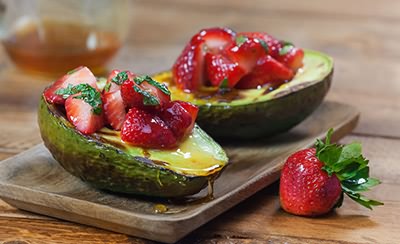 As dieters, we all love eating fruit throughout the year, especially a nice fresh selection out of the cooler — so much so that having the recommended 2 to 3 servings of fruit per day is easy.
As dieters, we all love eating fruit throughout the year, especially a nice fresh selection out of the cooler — so much so that having the recommended 2 to 3 servings of fruit per day is easy.
We can thank Mother Nature for creating fruits in so many incredibly vibrant colours and tasty flavours, but with so many choices available, sometimes browsing the produce section of your grocery store can leave you guessing about the best ones to pick.
Knowing what you want and need from fruits nutritionally can make it easy to make the right choices for your diet.
Best Low-Carb and Weight-Loss Options
During the Atkins Diet craze, when stats showed an amazing 1 in 10 adults were watching their carb intake, fruit consumption dropped because natural fruit sugars were considered taboo to any carbohydrate-restricted diet.
This is a shame because so many valuable nutrients and antioxidants, as well as sources of water and fiber, are lost when avoiding fruit.
Fruit deprivation is unnecessary because there are viable low-glycemic fruit choices that have minimal to no effect on insulin and blood sugars.
For the carb-conscious eater, berries, cherries and grapefruit are your best choices and when you are selecting fruit, always choose those that are not quite ripe as they have less naturally occurring sugar.
Best Fruits for Heart, Cancer Protection and Immunity
The orange fruits are an excellent source of beta-carotene. Your best choices are oranges, mango, cantaloupe and apricots.
The Harvard School of Public Health reports that these carotenoids are precursors to vitamin A and are potent antioxidants. They protect cells from the ravages of free radical damage (oxidation) that contributes to disease and aging.
These compounds promote cellular immunity and reduce the risk of several types of cancers including those of the skin, lung, stomach and prostate.
Berries do so much for our immunity. The phytochemicals found in red berries and fruits, including lycopene and anthocyanins, are being studied extensively for their protective benefits.
Eating only eight strawberries a day may help reduce the risk of heart disease and some types of cancer, preserve memory and lower blood pressure.
Like all berries, strawberries are low in calories and packed with high levels of fiber, are the highest in vitamin C of all fruits and contain other antioxidants that help bolster the immune system.
Raspberries, blackberries, elderberries and boysenberries all provide vitamins, minerals and phytonutrients which improve immunity, decelerate the aging process, and guard against chronic disease.
The red colour of these berries is a sure sign of their benefits for heart health along with cherries, cranberries, pink and red grapefruit, red grapes, red apples and pomegranates.
Cranberries, in particular, are rich in polyphenol, an antioxidant that can reduce the risk of prostate cancer, strokes, gum disease and urinary tract infections.
Pomegranates, featured on many advertising billboards in Toronto, are currently touted as the cardiologist’s aid because of their antioxidant properties which are beneficial for the heart and protect against cancer.
And, let’s not forget tomatoes. They are rich in lycopene and are especially helpful to men who are concerned with the prevention of prostate disease.
Best Fruits For Anti-Aging and Your Skin
Consuming an apple a day can stay the doctor away – mainly if you eat the skins. Apples contain many phytonutrients which are protective for the brain cells and improve immunity.
Quercitin, a natural antihistamine and antioxidant in the skin of apples, can assist with the prevention of cancers, allergies, Alzheimer’s disease and blood clots while the pectins in apples also offer cancer protection.
If you want a smoother-looking skin, consume avocados. They contain healthy, monounsaturated oils and antioxidants, including glutathione.
Avocados are highest in lutein, an antioxidant that is especially useful for eyes and which also protects from prostate and breast cancer.
They also have beneficial effects on cholesterol and are a source of potassium, useful for blood pressure regulation and stroke prevention.
The oils in avocados assist with weight loss rather than weight gain, as previously believed in the low-fat diet era, and can be added to salads, sandwiches or consumed as a dip.
When eaten in the appropriate amounts and proper balance with lean protein sources (chicken, fish, and turkey) and low-glycemic carbohydrates (whole grains and vegetables), the healthy fats in avocados make us feel full, assist with stabilizing insulin levels and reduce cravings.
Brain Power
There is growing evidence that blueberries are great disease fighters. Blueberries are high in antioxidants including vitamins C and anthocyanin, the pigment that gives blueberries their color, which provides the majority of this berry’s antioxidant, anti-aging and eye -protective action.
Compared to all other fruits and veggies, blueberries are tops for their antioxidant protection.
They are also an excellent source of fiber and potassium, and surprisingly, researchers have found that subjects who eat blueberries before a test perform better.
Add blueberries to your cereal, oatmeal, and smoothies or eat frozen ones when you are craving something sweet.
Are You Still Not Getting Enough Fruit?
Try this simple smoothie recipe for breakfast:
- 6 to 8 ounces of soy milk or water
- 1 cup of berries
- 2 tbsp of plain organic yogurt
- 2 tbsp of ground flaxseeds or Salba
- 25 to 30 grams of vanilla-flavoured whey protein isolate
- 4 ice cubes (optional)
Blend everything and enjoy!




